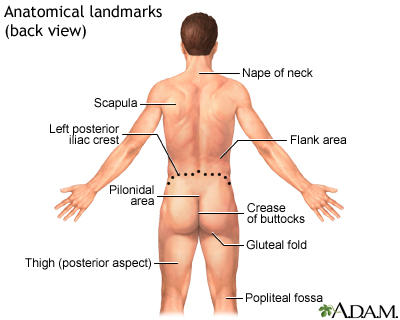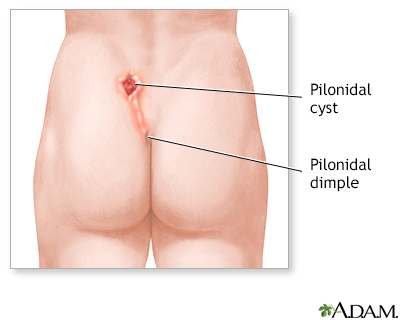Pilonidal sinus disease
Pilonidal abscess; Pilonidal sinus; Pilonidal cyst; Pilonidal disease
Pilonidal sinus disease is an inflammatory condition involving the hair follicles that can occur anywhere along the crease between the buttocks, which runs from the bone at the bottom of the spine (sacrum) to the anus. The disease is benign and has no association with cancer.
Pilonidal disease may appear as:
- A pilonidal abscess, in which the hair follicle becomes infected and pus collects in the fat tissue
- A pilonidal cyst, in which a cyst or hole forms if there has been an abscess for a long time
- A pilonidal sinus, in which a tract grows under the skin or deeper from the hair follicle
- A small pit or pore in the skin that contains dark spots or hair
Images


Considerations
Symptoms may include:
- Pus draining from a small pit in the skin
- Tenderness over the area after you are active or sit for a period of time
- Warm, tender, swollen area near the tailbone
- Fever (rare)
There may be no symptoms other than a small dent (pit) in the skin in the crease between the buttocks.
Causes
The cause of pilonidal disease is not clear. It is thought to be caused by hair growing into the skin in the crease between the buttocks.
This problem is more likely to occur in people who:
- Are obese
- Experience trauma or irritation in the area
- Have excess body hair, particularly coarse, curly hair
Home Care
Wash normally and pat dry. Use a soft bristle scrub brush to prevent the hairs from becoming ingrown. Keep the hairs in this region short (shaving, laser, depilatory) which may decrease the risk of flare-ups and recurrence.
When to Contact a Medical Professional
Contact your health care provider if you notice any of the following around a pilonidal cyst:
- Drainage of pus
- Redness
- Swelling
- Tenderness
What to Expect at Your Office Visit
You will be asked for your medical history and given a physical examination. Sometimes you may be asked for the following information:
- Has there been any change in the appearance of the pilonidal sinus disease?
- Has there been any drainage from the area?
- Do you have any other symptoms?
Pilonidal disease that causes no symptoms does not need to be treated.
A pilonidal abscess may be opened, drained, and packed with gauze. Antibiotics may be used if there is an infection spreading in the skin or you also have another, more severe illness.
Other surgeries that may be needed include:
- Removal (excision) of the diseased area
- Skin grafts
- Flap operation following excision
- Surgery to remove an abscess that returns
References
Gunter RL, Johnson EK, Steele SR. Anorectal: management of pilonidal disease. In: Cameron J, ed. Current Surgical Therapy. 14th ed. Philadelphia, PA: Elsevier; 2023:287-350.
Kliegman RM, St. Geme JW, Blum NJ, et al. Surgical conditions of the anus and rectum. In: Kliegman RM, St. Geme JW, Blum NJ, et al, eds. Nelson Textbook of Pediatrics. 22nd ed. Philadelphia, PA: Elsevier; 2025:chap 392.
Surrell JA. Pilonidal cyst and abscess: current management. In: Fowler GC, ed. Pfenninger and Fowler's Procedures for Primary Care. 4th ed. Philadelphia, PA: Elsevier; 2020:chap 31.
BACK TO TOPReview Date: 11/25/2023
Reviewed By: Debra G. Wechter, MD, FACS, General Surgery Practice Specializing in Breast Cancer, Virginia Mason Medical Center, Seattle, WA. Also reviewed by David C. Dugdale, MD, Medical Director, Brenda Conaway, Editorial Director, and the A.D.A.M. Editorial team.

Health Content Provider
06/01/2025
|
A.D.A.M., Inc. is accredited by URAC, for Health Content Provider (www.urac.org). URAC's accreditation program is an independent audit to verify that A.D.A.M. follows rigorous standards of quality and accountability. A.D.A.M. is among the first to achieve this important distinction for online health information and services. Learn more about A.D.A.M.'s editorial policy, editorial process and privacy policy. A.D.A.M. is also a founding member of Hi-Ethics. This site complied with the HONcode standard for trustworthy health information from 1995 to 2022, after which HON (Health On the Net, a not-for-profit organization that promoted transparent and reliable health information online) was discontinued. |
The information provided herein should not be used during any medical emergency or for the diagnosis or treatment of any medical condition. A licensed medical professional should be consulted for diagnosis and treatment of any and all medical conditions. Links to other sites are provided for information only -- they do not constitute endorsements of those other sites. © 1997- 2025 A.D.A.M., a business unit of Ebix, Inc. Any duplication or distribution of the information contained herein is strictly prohibited.
